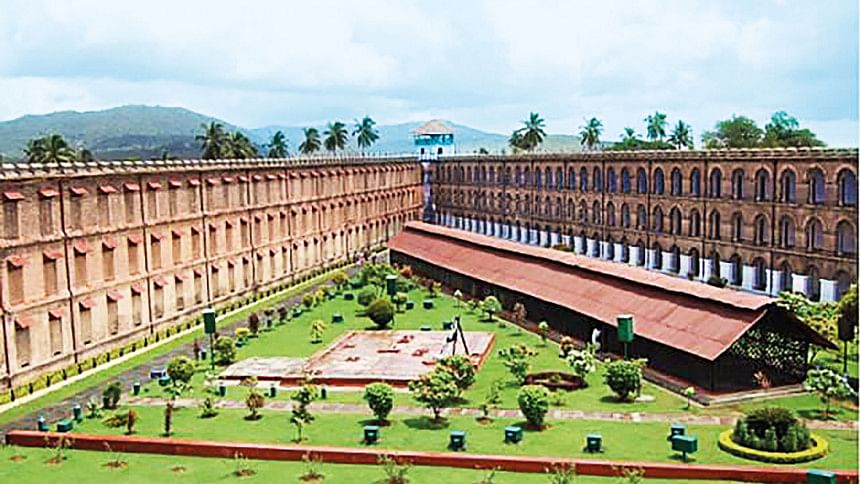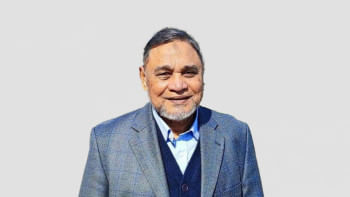Minnat Ali’s Kafoner Lekha and the biography of an autobiography

After savouring English and world literature for quite a while, I developed an interest in South Asian literature. This led me to study writers of this literary tradition. The latest in my list of authors is Minnat Ali (1932-2008), the recipient of the 1975 Bangla Academy Literary Award for short stories. I grew up hearing so much about the wordsmith of our district Brahmanbaria, but never had an opportunity to meet him in person.
During my trip to Bangladesh in February 2020, I contacted some of his relatives and family members to know more about the writer and, if possible, collect his writings. Upon my request, one of his relatives, Mr Shamsul Alam Shahin (1964- ) of our village Araisidha directed me to Minnat Ali's eldest son Khushbu Mohammad Al Aman (1963-). I met Mr Al Aman at "Shuvo Bari" – as Minnat Ali's homestead is named – at the heart of Brahmanbaria town. Mr Al Aman treated me with proverbial Bangladeshi hospitality. He shared with me insights into the literary career of his father and was courteous enough to present some of his late father's books to me as gifts. Among them was Kafoner Lekha (2005).
Once back in Kuala Lumpur, I read the books. Even though the title sounded familiar, I was certainly not prepared for the treasure trove I found within the covers of Kafoner Lekha. In the book, Minnat Ali retells the autobiography of the renowned scholar, writer and freedom fighter Fazl-e-Haq (also spelled as Fadl-e Haqq) Khairabadi (1796-1861) – so named because he was born in Khairabad in what is now the Indian state of Uttar Pradesh. According to scholar Jamal Malik at Germany's Erfurt University, Khairabadi "was one of the first political prisoners of colonial times, who … resigned from the post of kutchery chief and … drafted the first constitution of Independent India based on the 'principles of democracy.'"
In his autobiography, Khairabadi provides an eye-witness account of the Great Rebellion of 1857-59 and its aftermath. A landmark event in British colonial history in South Asia, the Great Rebellion (known as Sepoy Mutiny in colonial officialese) impacted colonial relations in the region for the next ninety years. A number of local patriots and freedom fighters challenged imperialism head-on and, consequently, bore ruthless cruelty of the British occupying power. Khairabadi narrates the tragic end of Mughal rule in Delhi and critiques the sell-out intellectuals and opportunists who colluded with the British in return for perks and privileges. They made it possible for the foreign power to establish dominion over, and snatch independence from the people of South Asia.
The sexagenarian Khairabadi actively participated in the Rebellion. Moreover, as a prominent intellectual and religious scholar, he issued the famous anti-colonial nationalist clarion call fatwa-e-jihad against the British. He declared that it was a religious duty to fight the colonial system of exploitation. He visited Ayodhya (Ajodhya) and other near and far-off areas to deliver firebrand speeches and motivated freedom fighters to jump into the battle against British rule to reclaim independence.
The colonial government became alarmed and accused Khairabadi of treason. After the fall of Delhi, it took prolonged punitive measures against the people of the land. Khairabadi and other anti-colonial intellectuals were arrested, tortured and faced punishments, including death. In 1859, a sham trial was conducted and Khairabadi was exiled for life on the Andaman Islands in the Bay of Bengal.
Though now a tourist destination and often compared to Hawaii for its scenic beauty, during the colonial period Andaman was a nightmare and synonymous with a death sentence, especially for anti-colonial freedom fighters. Mainly because of the horrors associated with the Andaman high-security prison and "the strong currents and shark infested waters surrounding it," the island gained notoriety and was popularly called kala panir desh (land of black waters).
At that time, the deputy jailor of the Andaman prison was a knowledge-thirsty Englishman with a deep interest in eastern traditions, especially Indian astronomy. At his disposal was a precious Persian manuscript on the subject. He knew there were erudite scholars among the inmates under his charge and gave it to one to unpack and decipher its content. That prisoner passed the work to Khairabadi who embraced it as a godsend opportunity to engage in scholarly activities after a long gap. He translated and annotated the book for the benefit of the jailor who read it and was amazed by the depth of Khairabadi's knowledge, as reflected in his notes and commentary. The jailor then rushed to the prison barracks to meet the great scholar.
Khairabadi was away on penal servitude (hard labour). After waiting for some time, the jailor saw him returning to the prison barracks with a spade on his shoulder and a bamboo basket in his armpit. This scene deeply moved the jailor who could not control his tears. He removed the spade and basket from Khairabadi's hands and deplored that such a man of letters had to do menial, laborious tasks with ordinary prisoners.
From that day onwards, the jailor spared Khairabadi prison labour. Meanwhile, having been exempted from penal servitude, Khairabadi decided to write his autobiography. He managed to collect some charcoal to use as pen and fabric material as paper and started writing his memoirs about the Great Rebellion in Arabic.
There was another writer-scholar named Inayat Ahmad from Kakori in Uttar Pradesh who had been jailed in Andaman before Khairabadi. Inayat Ahmad is known to have written a biography of Prophet Muhammad in prison and did a British official a comparable favour by translating an important Persian book on geography titled Taqwim al-Buldan (A Sketch of the Countries) by the great scholar Abul-Fida (1273-1331). Upon recommendation by that British official, Inayat Ahmad was released from Andaman prison. When seeing off Inayat Ahmad, Khairabadi gave him his manuscript written on shrouds, saying, "Dear Brother, please give these grave clothes to my son Abdul Haq."
The Andaman prison authority did not scrutinize the content of the clothing parcel, as they took it for grave clothes. The parcel arrived in mainland British India safely. Meanwhile, artists, writers and the intellectual community of the subcontinent submitted petitions to the Privy Council in London for Khairabadi's acquittal. As a result, in 1861 a release order was issued and his second son Shamsul Haq collected it from the then British colonial administrative centre of Calcutta.
With the release order in hand, Shamsul Haq started his voyage for Andaman in order to bring back his father. After four-day long sea journey when he reached Andaman, he found a long funeral procession. "Who passed away?" he enquired. "The well-known scholar Fazl-e-Haq Khairabadi," came the reply. Shamsul Haq immediately said inna lillahi wa innna ilaihi rejiwoon and cried out aloud: "Abba!" He joined the procession, buried his father in the ground of Andaman and returned home with a broken heart.
In the course of time, scholars of British India decoded the text of Khairabadi's autobiography written on grave clothes, made copies and circulated them to various parts of the region. They did so in secrecy, fearing colonial surveillance, censorship and punitive measures. After many decades in 1941, politician Maulana Abul Kalam Azad (1888-1958) persuaded a scholar named Abdus Shahid Khan Sherwani to translate the work into Urdu. While writing its introduction, Abul Kalam Azad titled the unnamed manuscript Sawratul Hindia (Indian Rebellion) under which the autobiography is now known. Soon after its Urdu translation along with the original Arabic text was published, the colonial government confiscated all its copies and subjected the publisher to harassment and torture. The book was freely available to the public only after independence in 1947.
[Acknowledgement: I am indebted to Minnat Ali's grandson, Md Habib Ullah Mormo for providing me with biographical information.]
Md. Mahmudul Hasan, PhD, is with the Department of English Language and Literature at International Islamic University Malaysia.

 For all latest news, follow The Daily Star's Google News channel.
For all latest news, follow The Daily Star's Google News channel. 



Comments